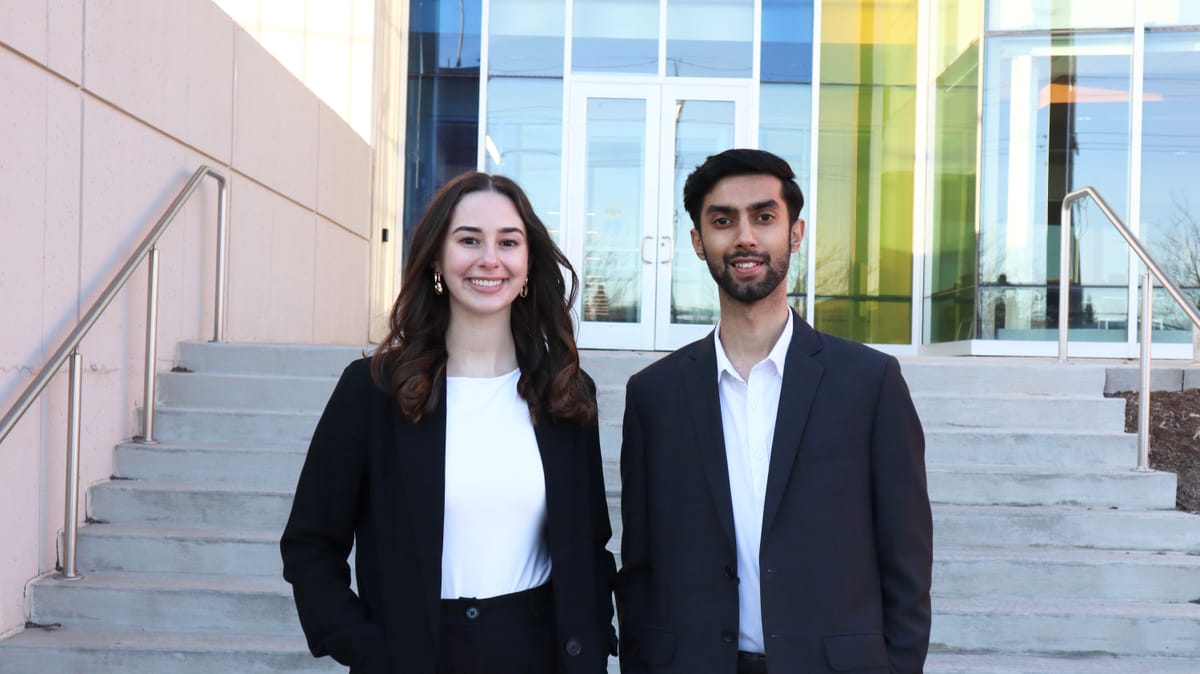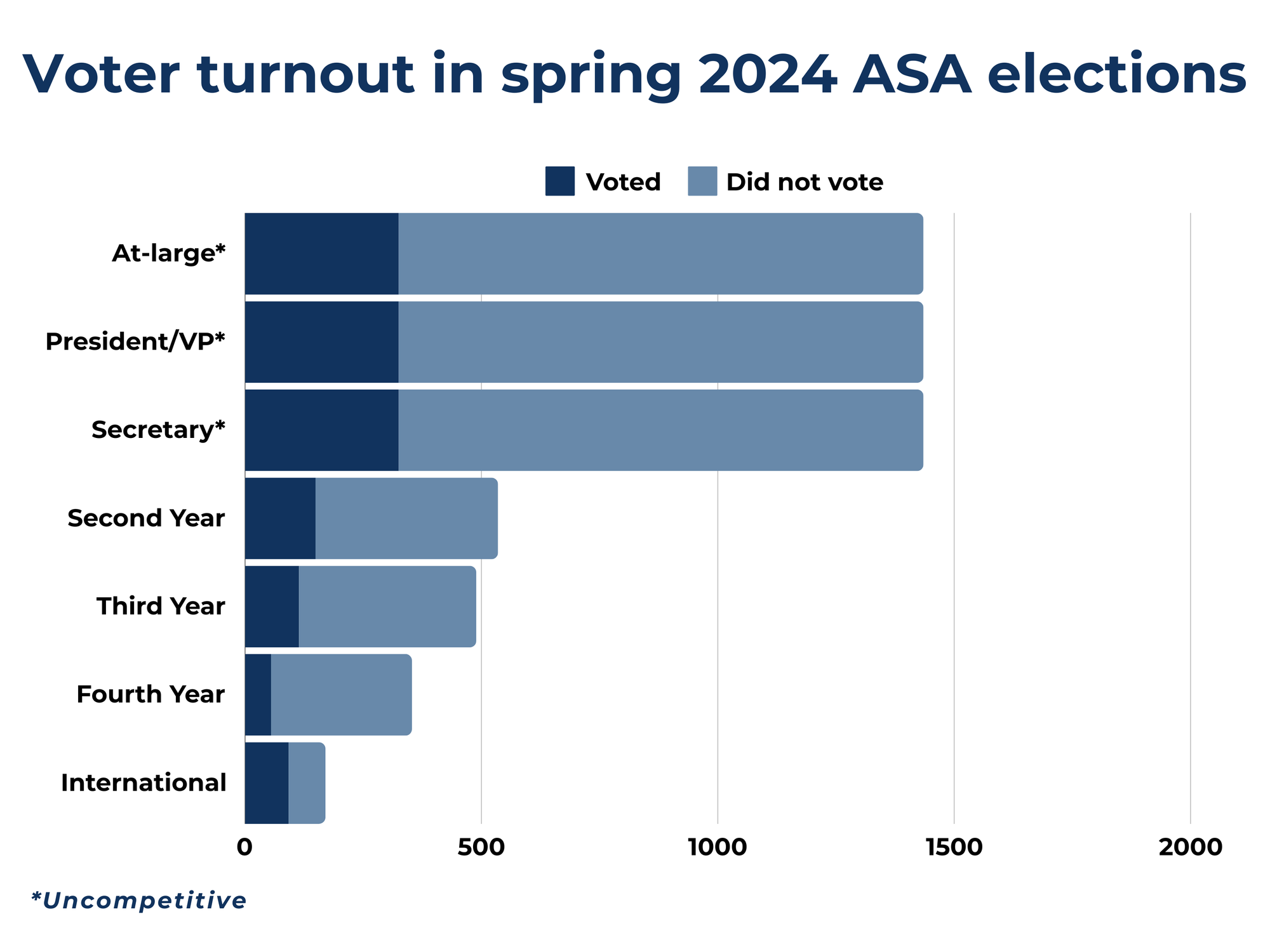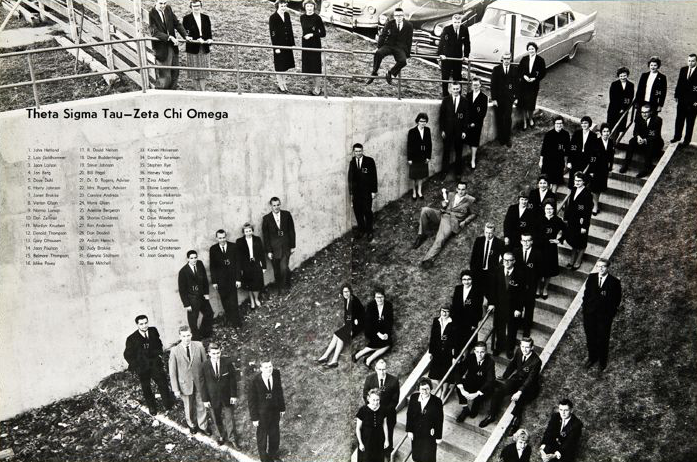ASA announces election results for next fall's senate

On March 28, at 5 p.m., the polls for the Augustana Student Association’s 2024 spring elections closed after three days of voting. Less than an hour later, the election results were announced.
Elections for president, vice president and secretary were uncontested. The ASA’s 2024-2025 president will be junior Annie Johnston and second-year Prince Adhikari.
Johnston served as committee chair of the ASA Sustainability in Housing and Dining Committee for the past two years after one year as a freshman senator, and Adhikari served as ASA’s technical director this year.
Johnston and Adhikari both said the uncontested race was largely due to senators being unable to find running mates they aligned with.
“Both of us were offered by a lot of other people as well,” Adhikari said. “But it was up to us, and we decided on how to proceed as a ticket and both of us ended up as a ticket.”
Johnston and Adhikari summarized their goals as an administration as innovation through empowerment, transparency, sustainability and collaboration through engagement.
“Since the pandemic, our campus has experienced low rates of student engagement,” Johnston said. “Prince and I both believe that ASA collaboration and direct partnerships with various student orgs across campus are an important part of bolstering student engagement on campus.”
Johnston also said she was excited to continue to advocate for student needs as Augustana’s “Viking Bold: The Journey to 2030” strategic plan progresses.
Current ASA President Lauren Teller said she is excited for the new executive board.
“They were the candidates that I was hoping to see come up,” Teller said. “For over a year now, I have thought Annie would make a great ASA president.”
Sophomore Carson Steichen won the uncontested election for ASA’s secretary position. In addition to keeping meeting minutes, Steichen plans to start an ASA newsletter that outlines what ASA is doing to better inform leaders of registered student organizations.
“A lot of the work we do is behind the scenes,” Steichen said. “I would like to see a newsletter to inform the RSOs of what we are doing, how we are doing and anything to look forward to.”
Next year’s senate will be fairly evenly split between new and incumbent senators, with nine incumbent senators holding on to their seats and 10 first-time senators picking up positions.
Sophomore Surafel Zeleke is one new senator who was both excited and surprised to be elected as a third-year senator in the most competitive race this year with seven candidates.
“To be honest I never thought I would win this because I am new to this, and people have to choose and trust me even though they don’t know me,” Zeleke said. “I want to make a big difference. I was overwhelmed and really happy that I won.”
The only incumbent senator to lose a senate race was freshman Anna Pirrung, who said she was still content with her experience running for senate.
“Through campaigning, I was able to meet and reach out to many new people that I might not have otherwise known,” Pirrung said.
A total of 17 candidates competed for the 12 year-based senate seats this spring. Six more candidates ran for the four at-large seats. Two students ran for one Augie Access seat and four students competed for two international seats.
Turnout was low this year with only 325 students, or 17.37% of undergraduates, voting in the election, the lowest number and percentage of students in the past eight years.

Heavily contested senate elections this year likely helped bolster voting numbers, as all but the fourth-year senator race were contested. However, senior Slater Dixon, current ASA secretary and election commissioner, cited an uncontested presidential race as the main reason for low turnout, even in a year with much more competition for senate seats than in the recent past.
“To break that twenty percent mark and get up to even thirty or forty percent, you really need a competitive presidential race,” Dixon said.
One way the senate attempted to incentivize participation was through Instagram giveaways of a $200 textbook voucher and $50, $25 and $15 of Lyft credits.
Adhikari, ASA’s current technical director, came up with the idea for the giveaway. The giveaways were paid for using money from ASA’s election budget, which had a $400 surplus from this year’s fall elections and another $500 allocated for tabulation and advertising this semester’s elections.
“It wasn’t really planned ahead of time,” Dixon said about the giveaways. “It was a last minute effort. We were really worried this year from a turnout perspective considering there wasn’t a presidential election. It seemed like student enthusiasm about ASA was at kind of a low.”
Other new methods of promotions included Tik Tok videos and periodically releasing how many students had voted in the election on the ASA Instagram.
“I think this was effective because every time the numbers were released, turnout happened to increase by 30 to 40 voters,” Adhikari said. “Especially when the Tik Tok was released, the number went up by around 60 voters.”
Multiple changes to this year’s elections from previous years likely also impacted voting numbers.
Graduating seniors were not allowed to vote in this year's election, lowering the number of eligible voters. With seniors excluded, 22.65% of eligible undergraduates voted in the elections, a percentage more comparable with voting turnouts in recent uncontested ASA presidential elections.
Another major change was that students were only allowed to vote for the senators running for their year and the at-large senators. In the past, all students were allowed to vote for second, third and fourth-year senators. This change ensured senators would be elected by the constituents they are intended to represent, Dixon said.
ASA has also eliminated treasurer from the ballot. Similarly to how ASA’s technical director is selected, a committee within ASA will be formed to find and nominate a senator for treasurer who will be appointed later in the spring. Dixon said this change was enacted so the treasurer position is not decided by “popularity contest” and a responsible person is chosen for the role that handles ASA’s finances.
Finally, elections for at-large senators were held along with most other elections in the spring as opposed to next fall, which has been the case in previous years. Adhikari said this change will prevent new freshmen who may not yet be qualified to represent all of Augustana from running for at-large senator in their first semester. Additionally, having more senators elected before the end of the year will allow ASA to get to work quicker come fall.
“It is good to have all of those senate elections at the same time,” Dixon said. “Having a quorum of senators will let us hit the ground running when we get back in the fall.”
The newly elected members of ASA will be inaugurated on April 22 at 10 a.m. on the Commons patio.
Applications for ASA executive board positions of treasurer and technical director opened on April 2 and will close on April 7 at midnight.



